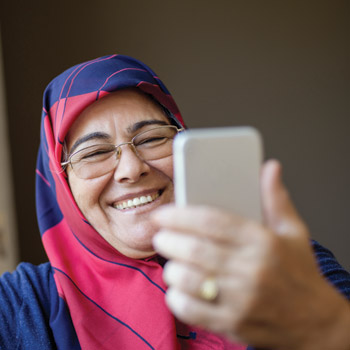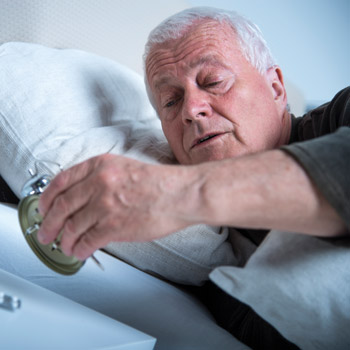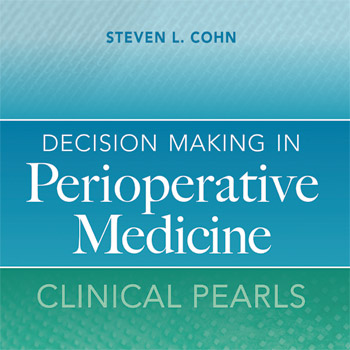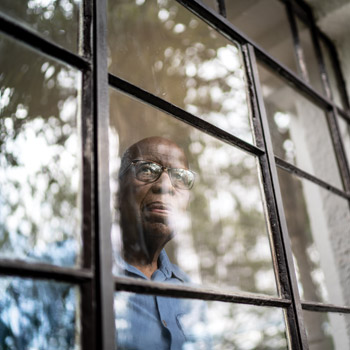Phone calls ease isolation during COVID-19
A trial measuring the effect of phone calls to homebound adults early in the pandemic found improvements in loneliness, depression, and anxiety.
Where: University of Texas at Austin.
The issue: Combating loneliness among at-risk adults during the COVID-19 pandemic.
Background
In early 2020, researchers in Texas, working with a local branch of Meals on Wheels, were gearing up for a trial that would deliver medically tailored meals and provide social connection to homebound adults. It's not hard to predict what happened next.

“COVID struck, and all of a sudden, that program could not launch in the way that we had planned,” said Maninder K. Kahlon, PhD, vice dean of Health Ecosystem, director of Factor Health, and associate professor in the department of population health at the University of Texas at Austin Dell Medical School. But with that challenge came another opportunity, she said. “We realized that actually, the issue that was starkly in front of us was that these folks were even more isolated than before.”
The research team decided to build on their existing strong partnership with Meals on Wheels to test another kind of program, which they named Sunshine Calls. “We used some of the ideas that we had been developing, and then really leaned into them to very rapidly develop a program that we thought might actually make a difference, definitely on loneliness,” Dr. Kahlon said.
How it works
Two hundred forty Meals on Wheels participants were randomly assigned to receive phone calls or no phone calls from a group of laypeople, 17 to 23 years of age, who had received brief training in empathetic conversational techniques. The laypeople were volunteers but received a $200 stipend at the end of the trial.
During the four-week trial, each layperson called a panel of six to nine study participants daily for the first five days, and then asked how many calls they would like to receive and at what times going forward. Study participants could opt to be called less frequently but were required to receive at least two calls per week.
The lay callers were trained that their main goal was to learn as much as they could about the people they were calling by asking specific questions about topics that they raised. “At the end of four weeks, if the [lay] caller felt like they could tell you things about the other person, they could tell you their likes and their dislikes? Excellent,” Dr. Kahlon said. “If you really didn't know much about the other person, well, something went wrong.”
Results
An analysis of the program was published Feb. 23, 2021, by JAMA Psychiatry. Homebound participants ranged in age from 27 years to 101 years, and 63% were 65 years of age or older. Seventy-nine percent were women, 39% were Black or African American, and 22% were Hispanic or Latino. Telephone calls ended up lasting an average of 10 minutes each week. If participants reported concerns regarding safety, food, or finances, the lay callers were instructed to contact Meals on Wheels staff, who would then schedule a follow-up call.
Thirteen participants in the intervention group and one in the control group were lost to follow-up, but among those who completed the trial, the patients who received phone calls showed improvements of 1.1 points (P<0.001) on the UCLA Loneliness Scale and 0.32 point (P=0.06) on the De Jong scale for loneliness, an improvement of 1.5 points on the Personal Health Questionnaire for Depression (P<0.001), and an improvement of 1.8 points on the Generalized Anxiety Disorder scale (P<0.001) compared to controls. On the Short-Form Health Questionnaire Survey, general physical health between groups did not differ, but mental health improved by 2.6 points among those who received the intervention (P<0.003).
Dr. Kahlon noted that while loneliness scores at baseline were generally high overall and some improvement there might have been expected, the scores for depression and anxiety fell into a much wider range. “When you've got such a distribution, even if this was going to impact depression or anxiety, we weren't convinced that we would actually see something that was significant,” she said. “The fact that these were significant results for such a broad range of scores on depression and anxiety was really striking and surprising, given that it was just a short intervention that we did.”
Challenges
The biggest challenge of the study was its breakneck pace, said Dr. Kahlon, since it was designed, conducted, analyzed, and published in less than a year. “We needed to get it out, because we wanted people to see that actually, there are some things that are relatively straightforward to do” to help combat COVID-19-related loneliness, she said.
Next steps
“The biggest question unanswered by this research is the duration of the impact,” said study coauthor Elizabeth A. Jacobs, MD, MAPP, FACP, now vice president of research at the Maine Medical Center Research Institute and interim director of the Center for Outcomes Research & Evaluation in Scarborough, Maine.
She noted that the participants in the program remained homebound at the end of the study and that their risk of reverting to baseline levels of loneliness, depression, and anxiety could be fairly high. “What is the impact afterwards of us stopping the program? Or what would be the optimal way in which you would prolong the impact? Would it be once a month, every other week?” In response to these concerns, Dr. Kahlon said, the study participants were offered the opportunity to continue receiving weekly check-ins via Meals on Wheels.
Another possibility is to tie the program to chronic disease self-management, Dr. Kahlon said. “If people have both depression and diabetes, is there a way that this can come together with traditional diabetes management programs to get a greater impact?” she asked.
Words of wisdom
Partnering with a community group that already has patients' trust is vital to this type of intervention, Dr. Jacobs advised. She noted that the Meals on Wheels organization helped her and her coauthors increase enrollment, especially from underserved groups. “They were incredibly valuable to getting to being seen as a trusted organization who is going to treat participants well in research,” she said.
Dr. Kahlon invited those interested in setting up a similar program to visit the Sunshine Calls website. “We actually have a toolkit, and if people write in to us, we will send them a little document we created which has a lot of our learnings, and they can ask us for any additional information,” she said. “We're really happy to share.”





